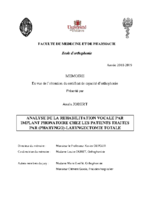Mémoire
Jobert Anais
Analyse de la réhabilitation vocale par implant phonatoire chez les patients traités par (pharyngo)-laryngectomie totale
FrançaisConsulter le texte intégral (format PDF)

Résumé
Français
Analyse de la réhabilitation vocale par implant phonatoire chez les patients traités par (pharyngo)-laryngectomie totale
La réhabilitation vocale des patients (pharyngo)-laryngectomisés porteurs d’un implant phonatoire concerne l’apprentissage de la voix trachéo-oesophagienne. La qualité de cette voix de substitution est d’une importance cruciale pour un accès à une communication orale optimale. La qualité de voix trachéo-oesophagienne témoigne aujourd’hui d’une grande variabilité selon les patients et leurs modalités de traitement et de prise en charge. Il était donc pertinent d’évaluer la qualité de voix trachéo-oesophagienne des patients (pharyngo)-laryngectomisés afin de rendre compte de cette hétérogénéité et des difficultés éventuelles rencontrées. Une étude rétrospective a été réalisée au sein du service ORL du CHU de Poitiers sur un échantillon de dix patients évalués à douze mois minimum de la fin de toute thérapie. Le protocole comprenait différents outils d’évaluation subjective et objective de la qualité de voix trachéo-oesophagienne. Les résultats ont mis en évidence une qualité de voix satisfaisante en termes de fonctionnalité au quotidien. Néanmoins, des difficultés persistaient, même à distance des traitements. Elles résultaient d’une atteinte physique et psychique et s’illustraient principalement par une altération du timbre vocal, une mauvaise gestion du souffle trachéal, des efforts à l’émission vocale ou encore une impossibilité à communiquer en groupe ou dans le bruit. De plus, le ressenti des patients quant à leur voix de substitution n’était pas toujours en lien avec le degré d’atteinte vocale objectivé. Ce ressenti pouvait également différer de celui de leur interlocuteur. Enfin, une variabilité de la qualité de voix trachéo-oesophagienne a pu être confirmée selon des facteurs inhérents aux patients et à leur parcours de soin. La prise en charge orthophonique du patient (pharyngo)-laryngectomisé doit tenir compte de la présence de ces difficultés sur le long terme tout en considérant la notion d’hétérogénéité qui nécessite de repartir de la plainte de chacun pour une prise en charge la mieux adaptée possible.
Mots-clés libres : laryngectomie totale, pharyngo-laryngectomie totale, voix trachéo-oesophagienne, qualité de voix de substitution, implant phonatoire, chirurgie, radiothérapie, orthophonie.
- Laryngectomie
- Voix oesophagienne
English
Vocal rehabilitation of (pharyngo)-laryngectomized patients with a phonatory implant concerns the learning of the tracheoesophageal voice. The quality of this substitutional voice is crucial to have access to optimal oral communication. The quality of the tracheoesophageal voice today can be quite varied depending on the patients and their treatment and management modalities. It was therefore relevant to evaluate the tracheoesophageal voice quality of (pharyngo)-laryngectomized patients in order to account for this heterogeneity and the possible difficulties encountered. A retrospective study was performed in the ENT department of the Poitiers University Hospital on a sample of ten patients evaluated at least 12 months before the end of any therapy. The protocol consisted in various tools to evaluate subjectively and objectively the quality of tracheoesophageal voice. The results highlighted a satisfactory voice quality in terms of everyday functionality. Nevertheless, even a long time after the end of the treatments difficulties persisted. They resulted from physical and psychological harm and were mainly illustrated by an alteration of the vocal tone, a bad management of the tracheal breath, efforts for vocal production or an impossibility to communicate in group or in noise. In addition, patients' feelings about their substitutional voice were not always related to the objective degree of vocal harm. This feeling could also differ from that of their interlocutor. Finally, it could be confirmed that the fluctuating quality of tracheoesophageal voice is due to patients’ inherent factors and their medical treatments. The speech therapy care of the (pharyngo)-laryngectomized patient must take into account these long term difficulties while considering the notion of heterogeneity which requires starting from the complaint of each one to provide the most suitable treatment.
Keywords : total laryngectomy, total pharyngo-laryngectomy, tracheoesophageal voice, substitutional voice quality, phonatory implant, surgery, radiotherapy, speech therapy.
Notice
- Diplôme :
- Orthophonie 1
- Établissement de soutenance :
- Université de Poitiers
- UFR, institut ou école :
- UFR Médecine et Pharmacie
- Domaine de recherche :
- Orthophonie
- Directeur(s) du travail :
- Xavier Dufour, Louise Duret
- Date de soutenance :
- 25 juin 2019
- Membres du jury :
- Xavier Dufour, Louise Duret, Marie Eveillé, Clement Garcia
Menu :
-
-
à propos d'UPétille
-
Voir aussi
Annexe :

-
Une question ?
Avec le service Ubib.fr, posez votre question par chat à un bibliothécaire dans la fenêtre ci-dessous ou par messagerie électronique 7j/7 - 24h/24h, une réponse vous sera adressée sous 48h.
Accédez au formulaire...
Université de Poitiers - 15, rue de l'Hôtel Dieu - 86034 POITIERS Cedex - France - Tél : (33) (0)5 49 45 30 00 - Fax : (33) (0)5 49 45 30 50
petille@support.univ-poitiers.fr -
Crédits et mentions légales
